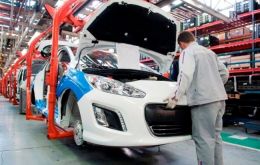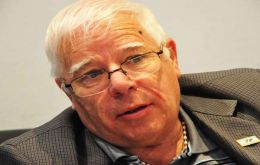MercoPress. South Atlantic News Agency
Stories for July 30th 2013
-
Tuesday, July 30th 2013 - 03:54 UTC
Mujica in veiled message tells Paraguay to return to Mercosur and remember it’s a landlocked country

Uruguayan president Jose Mujica was ironic about the conditions Paraguayan president elect Horacio Cartes demanded for his country’s return to Mercosur, but also in a veiled message called for ‘intelligence and pragmatism’ recalling that Paraguay is a landlocked country.
-
Tuesday, July 30th 2013 - 03:50 UTC
“The party is over” for Latam countries China-dependent on their exports

“The party is over” and Latinamerican countries should be concerned since the Chinese economy is slowing down, apparently entering a low growth period and many in the region have become notoriously ‘China-dependent’ after a decade of strong expanding sustained bilateral relations.
-
Tuesday, July 30th 2013 - 03:07 UTC
Uruguay needs ‘a dollar at 25 Pesos’ if it wants to remain competitive warn economists

Uruguay is too expensive in dollar terms and needs to adapt quickly because the adjustment will come anyway ‘and will be painful’ unless inflation is brought under control and costs equilibrium is reached with Brazil with a competitive dollar at 25 Pesos.
-
Tuesday, July 30th 2013 - 03:03 UTC
Eclac joins the club of Argentine government official stats disbelievers and says inflation is 20.5%

Following on the steps of the IMF (and World Bank) which has strongly questioned Argentine official stats (mainly inflation and GDP growth), the United Nations Economic Commission for Latin America and the Caribbean, Eclac, also joined the club of disbelievers since in its last report on the regional economy appealed to other stats’ sources.
-
Tuesday, July 30th 2013 - 02:48 UTC
Argentine auto-manufacturing boosts June and half year industrial production stats

Boosted by auto and metal-mechanic manufacturing industrial production in Argentina during June increased 3.8% compared to the same month a year ago, according to the latest release from Indec. Since April and May were also positive this means that the second quarter was up 3.5% over a year ago.
-
Tuesday, July 30th 2013 - 02:40 UTC
Falklands at C24: ‘Alejandro Betts misrepresents’, says Professor Willets

Mr. Alejandro Betts spoke on 20 June this year at the UN Special Committee on Decolonisation, as a petitioner on the “Falklands (Malvinas) Question.” It has been brought to my attention that his speech included a highly distorted account of my visit to the Islands to observe the referendum on behalf of the South Atlantic Council.
-
Tuesday, July 30th 2013 - 02:23 UTC
EU and China reach an ‘amicable solution’ on solar panel imports

The European Commission says it has reached “an amicable solution” with Beijing in a row over imports of Chinese solar panels. Both sides have agreed a minimum price for the panels, EU Trade Commissioner Karel De Gucht said.
